
Yes, this is the second time the Asheville Film Society has shown Josef von Sternberg’s Shanghai Express (1932). It’s showing again in part because it was one of the AFS’ most popular and well-received films. But more than that it’s just one of the best films of all time—as much an essential in its own way as Citizen Kane (1941). It’s also a film that really oughtn’t work, if you break it into its individual components. It’s basically a pulp adventure romance. It has intentionally arch and artificial dialogue that’s delivered in an oddly deliberate manner (director Josef von Sternberg wanted the characters to “talk like a train”). The situations are melodramatic and their resolutions no less so. The film was made by a man who prided himself on being a cynic, yet through some incredible alchemy Sternberg turned the whole thing into a compelling drama of love and faith that is ultimately one of the most romantic films imaginable.
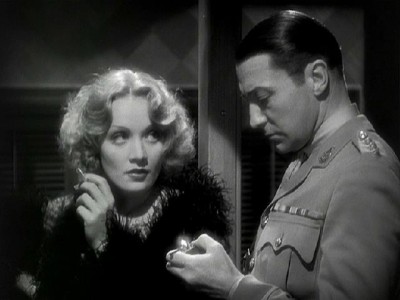
The story involves a train traveling through war-torn China on its way to Shanghai. Each of the passengers harbors secrets—only some of which will be completely revealed. The lead character is a classy prostitute known as Shanghai Lily (“It took more than one man to change my name to Shanghai Lily”)—and who is played by Marlene Dietrich at her most luminous, thanks to Sternberg, photographer Lee Garmes, and costume designer Travis Banton. Her adversary is her former lover, Capt, Donald Harvey (Clive Brook), with whom she is still in love, and who is still in love with her. The rest of the story—involving an enigmatic Eurasian (Warner Oland), a religious zealot (Lawrence Grant), a gambler (Eugene Pallette), a woman (Louise Closser Hale) who owns a “boarding house,” a Chinese prostitute (Anna May Wong), a French army officer (Emile Chautard), and a suspect German businessman (Gustav von Seyffertitz)—serves as the accompaniment to their romance and the drama that unfolds. It’s also one of the most gorgeous of all black-and-white movies.

Here is an augmented version of the more detailed review from 2011: Shanghai Express (1932) is the fourth of the remarkable run of seven films Josef von Sternberg made with Marlene Dietrich. If any one of those magnificently obsessive works can be said to be the best, it’s almost certainly Shanghai Express—a perfect blend of irony, style, pulp adventure and unbridled romanticism. It is, in fact, the first film that comes to my mind when the concept of the “magic of the movies” crops up. Its faux-exoticism, entirely created in the studio and on the backlots, is a masterpiece of design. Its slightly absurd story—a diverse group on a train held for ransom by a Chinese warlord (Warner Oland)—perfectly suits both Sternberg’s needs and his penchant for the tantalizingly trashy. The complete stylization—down to the deliberately flat, strangely rhythmic delivery of the dialogue—creates its own world. And by some inexplicable alchemy, everything comes together in a seamless fusion that manages to create a haunting drama of love and faith that is like no other.
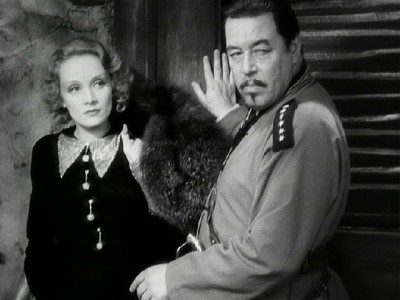
The film starts with a flurry of activity as its characters arrive and board the titular train. There are nine characters all told—“Shanghai Lily” (Dietrich), Capt. Donald Harvey (Clive Brook), Hui Fei (Anna May Wong), Henry Chang (Warner Oland), Sam Salt (Eugene Pallette), Rev. Dr. Carmichael (Lawrence Grant), Mrs. Haggerty (Louise Closser Hale), Eric Baum (Gustav von Seyffertitz), and Major Lenard (Emile Chautard)—and every one of them has a secret of some kind. Though Sternberg insisted that all his characters represented him (“spiritually”), there is, as usual in these movies, a specific Sternberg alter-ego—a character that resembles him physically and who will meet his downfall because of his obsession with the Dietrich character (at least until the final scene of the seventh and final film). In this case, it’s Henry Chang, marking the second time Warner Oland stood in for the filmmaker.
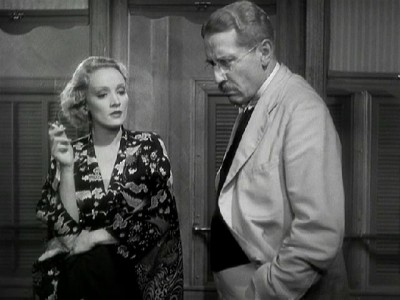
Our main interest, though, lies in Shanghai Lily and Capt. Harvey. They had once been lovers, but had parted because she refused to prove her fidelity and wanted to be taken on faith. (Faith is a key element here. Late in the film, it’s even remarked, “Love without faith is like religion without faith—it doesn’t amount to very much.) At that time, she’d simply been Madeleine. Now, she’s become the notorious “Shanghai Lily”—the embodiment (and then some) of every suspicion Harvey might have had (“It took more than one man to change my name to Shanghai Lily”). Of course, neither one of them is really over the other, which produces a cat and mouse game between them—only she’s now the cat. Or is she? The plot appears to say “Yes,” but the handling is more enigmatic, and her strange relationship with the apparently harshly judgmental Dr. Carmichael will reveal more than she ever wanted known.
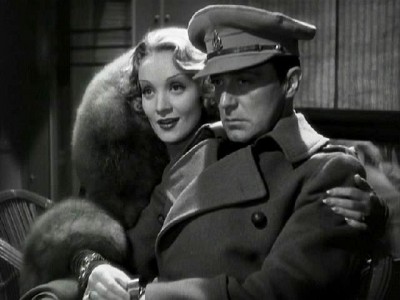
The extreme stylization of the film gives it a strange, dreamlike quality—and one that doesn’t appeal to everyone in that it extends to the performances. It’s unclear whether or not Sternberg let anyone in the cast—apart from Clive Brook, who had lived with Sternberg during their early days in Hollywood—in on exactly what he was after. When asked why he was having him deliver his dialogue in the film’s odd deadpan, almost mechanical and very measured manner, Sternberg told Brook, “This is the Shanghai Express. Everybody must talk like a train.” That may sound peculiar, but it works in that it not only adds to the slightly otherworldly quality of the film, but it allows the often deliberately absurd dialogue (“What good is a watch without you?”) come across as intentionally arch and funny. This—if you give yourself over to the approach—also makes the lines strangely moving.
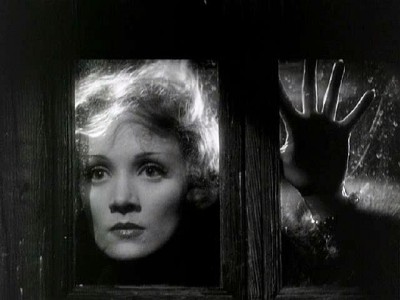
For me, the real question about Shanghai Express has always been whether or not Sternberg understood that all his irony and all his cynicism would add up to a gloriously romantic movie. The film may end with Dietrich literally removing a price tag from Brook and taking possession of his riding crop (suggesting that Brook has become the Sternberg character), but it never cancels out the almost giddy romance of it all. It’s interesting to realize that today Sternberg and Dietrich would be judged as co-dependent and sent off to counseling. In the 1930s that wasn’t an option. Instead, Sternberg made seven glorious films about their mutual obsession with each other. For this, we must be eternally grateful to the messy inadequacies of psychology at that time.
The Asheville Film Society will screen Shanghai Express Tuesday, April 8, at 8 p.m. in Theater Six at The Carolina Asheville and will be hosted by Xpress movie critics Ken Hanke and Justin Souther.



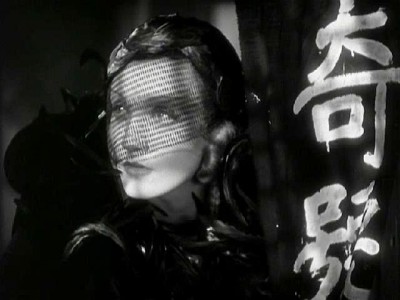
I’ve had people request we show this again. They damn well better show up.
I will be there, continuing my von Sternberg/Dietrich education.
What have you seen so far?
Just Blue Angel. The only other von Sternberg I’ve seen is Underworld and I liked it a lot.
For me The Blue Angel is the least of the seven Dietrich films. Underworld is good, but it’s comparatively restrained and more like a typical American silent movie than everything that comes after it. The difference between it and the film that follows it — The Last Command — is pretty mind-blowing as concerns technique.